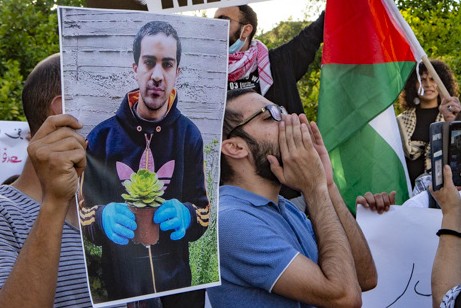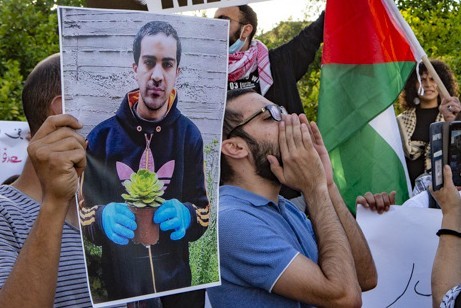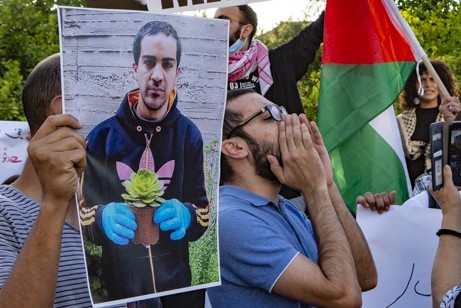Israeli Supreme Court upholds State Attorney’s decision not to appeal acquittal of Police Officer who killed Eyad al-Hallaq
Today, 11 April 2024, the Israeli Supreme Court issued a decision in which it dismissed the petition filed by Adalah and Meezaan Organization for Human Rights (Nazareth) on behalf of the parents of Eyad al-Hallaq against the decision of the Police Investigation Department (PID) and the State Attorney’s Office not to appeal the Jerusalem District Court's ruling that acquitted an Israeli police officer who killed Eyad almost four years ago.
CLICK HERE to read the Supreme Court decision [Hebrew]
CLICK HERE to read more about the petition
HCJ 6630/23 Rana Hallaq v. the Police Investigation Department et al.
Al-Hallaq, a 32-year-old autistic Palestinian man, was shot dead by an Israeli Border Police officer in Jerusalem’s Old City on 30 May 2020, while he was walking to the special needs school where he both worked and studied. Eyad, who noticed two police officers shouting and running toward him, instinctively fled in fear. As the officers ran after him, the police commander, who was never prosecuted, shot twice towards Eyad. Eyad sought refuge in a nearby garbage shed, where another officer followed him, opening fire and shooting him in the lower body. The officer shot him again in the upper body, while Eyad was lying on the ground, already injured, killing him instantly.
In October 2020, following a PID (also known as “Mahash”) investigation, it was announced that the police officer who shot Eyad would be criminally charged with reckless manslaughter. This prosecution is a rare occurrence as PID investigations almost never result in criminal charges against Israeli law enforcement officers. However, on 6 July 2023, the Jerusalem District Court acquitted the officer of all charges.
While the district court acknowledged most of the facts in the indictment, it ultimately accepted the police officer's claim of “perceived self-defense,” citing his assertion of feeling threatened. After the State Attorney’s Office informed Eyad's family that it would not appeal the district court's decision, on 5 September 2023, Adalah and Meezan, on behalf of the parents, petitioned the Supreme Court, arguing that the decision was extremely unreasonable and warranted Supreme Court review.
The petitioners argued that the district court's ruling sets new legal norms, and failing to challenge them would have significant consequences. As argued in the petition, the decision effectively lowers the threshold for the justifiable use of lethal force by police officers and could virtually eliminate all criminal accountability in cases where Palestinians are killed by law enforcement. The judgment unreasonably expands the parameters of self-defense in criminal law, relying solely on the subjective perception of danger by the officer, Adalah and Meezan argued.
The decision, handed down unanimously by Justices David Mintz, Khaled Kabub, and Ruth Ronnen, held that there is no basis for judicial interference in the prosecutor’s discretion as to whether to appeal the lower court’s ruling. The Supreme Court reasoned that it may supplant the prosecutorial authorities' judgment, only in highly exceptional and exceedingly rare circumstances, which, according to the justices, this instance does not fall within. The court found no evidence to suggest that the State Attorney's Office and the PID were influenced by extraneous considerations, extreme unreasonableness, or significant flaws. The court also dismissed the petitioners' assertion that the district court's ruling carries broader ramifications, noting that the ruling is pertinent solely to the particular case at hand and, in any event, does not constitute binding precedent, as it is a lower court's decision.
In response, Adalah commented:
“The Israeli Supreme Court's decision, finding that the district court’s acquittal of the officer who killed Eyad Al-Hallaq has no impact on the use of deadly force by the police against Palestinians, reveals a significant flaw in judicial reasoning and constitutes an egregious miscarriage of justice. The increasing number of cases where Palestinians are killed by Israel's security forces, who then enjoy clear institutional support solely based on shooters' claims of feeling a sense of danger, demonstrates a failure to hold these forces accountable. This Supreme Court decision reinforces such support and perpetuates the prevailing culture of impunity. In this case, the State Attorney’s Office, in deciding not to appeal the acquittal of the officer, chose to side with the perpetrator of the crime rather than with the victim and his family, resulting in an extreme case of injustice.”














